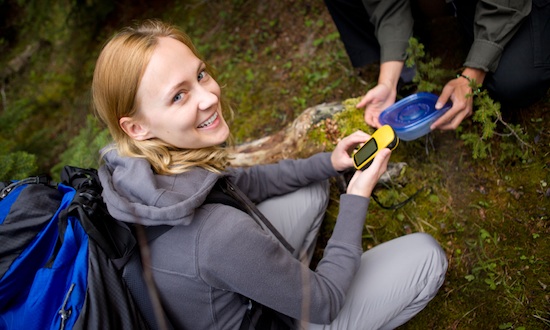Geocaching: Summer Fun for the Whole Family
July 15, 2013
If you are looking for an activity that the whole family will love, try geocaching. This fun hide-and-seek style game can be played from almost anywhere and is a great way to work as a team to make some incredibly memories.
What is Geocaching?
Geocaching is a game played all across the world. The activity began in 2000 when GPS accuracy began to improve. Some GPS enthusiasts started hiding “treasures” for their friends to find by giving them the GPS coordinates. They found that the GPS coordinates were so accurate that the items could be found. They started hiding more items and sharing them with others. People began hiding their own boxes and sharing coordinates and this was the birth of geocaching.
Now that geocaching has become a popular pastime, caches typically have a log that you can sign, showing you found the cache. Many caches also have small trinkets inside. Those who find the cache can take a trinket from the cache and replace it with a trinket of their own (of equal or greater value). You never know what you will find! Keeping a treasure chest of trinket finds and a photo log of all your adventures can provide great memories of your treasure hunting together as a family.
Getting Started
First things first, how do you find these cache coordinates? Geocaching.com is a comprehensive list of these hidden gems. Anyone can make a cache and add it to the database for others to find, but there are some guidelines that can be found on the site. When starting out, you will want to pick a cache that is ranked at a level 1 for difficulty. You may also choose one with a larger container. Caches can be incredibly small or as large as a drum. Cache container size is listed on the site along with how difficult the terrain is to manage in the area and how hard the cache is to find. Size descriptions will be as follows:
- Micro – Less than 100ml. Examples: a 35 mm film canister or a tiny storage box typically containing only a logbook or a logsheet. A nano cache is a common sub-type of a micro cache that is less than 10ml and can only hold a small logsheet.
- Small – 100ml or larger, but less than 1L. Example: A sandwich-sized plastic container or similar.
- Regular – 1L or larger, but less than 20L. Examples: a plastic container or ammo can about the size of a shoebox.
- Large – 20L or larger. Example: A large bucket.
- Other – See the cache description for information.
Once you have mastered the easy caches, try moving on to the more difficult ones. These may involve a bit of hiking or searching, so make sure to wear sturdy shoes, bring a flashlight, extra batteries, small trinkets to add the cache and anything else that is described on the cache page.
If you are going on a road trip or visiting another area, be sure to search for geocache sites in the area. You may be surprised how many hidden treasures are lurking around you. In fact, in Los Angeles alone there are over 18,000 caches!
Geocaching Terms
When looking for a Geocache site it is important to read the log notes. Others will post if they were able to find the site and how difficult it was to find. They may also note if the cache was damaged or missing. If you find a cache, leave feedback. However, if you are new to geocaching you may notice some strange terms in the notes section. Here are some common geocaching terms and their meaning.
- Muggl e- a non-geocacher
- TFTC – Thanks for the Cache
- BYOP – Bring Your Own Pen (to sign the logbook)
- CITO – Cache in trash out. Bring a trash bag along with you on your walks in the woods and pick up the occasional piece of trash you see on the trail. Even this small act can make a huge difference.
- DNF – Did not find
- FTF – First to find
- Hitchhiker – A hitchhiker is an item that is placed in a cache, and has instructions to travel to other caches. Sometimes they have logbooks attached so you can log their travels.
Geocaching is fun for the whole family and is addicting so watch out! Have you been geocaching? What was your first find?





